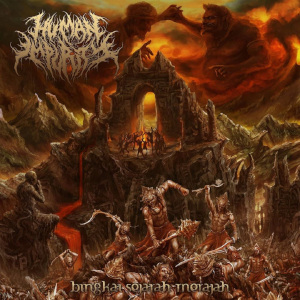


Ever since Jasad released Rebirth of Jatisunda in 2013, many other Indonesian brutal death metal bands were inspired to incorporate their culture and history into the metal they produce. One of those bands is Human Impurity. They formed in Tangerang Selatan in 2015 and released their full-length debut Bingkai Sejarah Merajah last year. The lyrics speak of that tumultuous time in Indonesian history when Hinduism and Buddhism were replaced with Islam. Old kingdoms fell and new ones were built atop the ruins. It’s a story that has been repeated since the dawn of civilization.
The album begins with droning instruments that not only create an ominous atmosphere, but also give the music a uniquely Indonesian identity. This is reinforced by the traditional Indonesian music at the beginning of songs like “Haringgit Kalimusada” and “Raga Wirasa”. The band’s style features a mixture of slam and raging brutal death metal, a formula that is quite common in their country. The drums offer up plenty of raging blast beats that are punctuated by nice fills. These are sometimes broken up by slower rhythms that include a large amount of double bass. Said double bass has a rapid tapping sound, but I don’t mind it that much. The bass mainly bolsters the rest of the music, though there are times when it makes itself more prominent and makes the experience more grisly.
The vocalist performs a guttural yet strangely hoarse growl that reminds me of both Dead Infection and the Turkish Cenotaph. They’re a bit unorthodox, but they sound brutal nonetheless. The guitars play menacing tremolo riffs and chord progressions during the fast-paced parts. They sometimes interject short technical displays between them. They play a lot of simple chugging riffs during the slow parts, but they still sound fresh and exciting. This is due in part to the strong delivery and production. The band saves their best riffs for the last song, which sounds dark and spine-chilling.
Bands like Human Impurity bring me joy, for not only do they produce great metal, they also incorporate their cultural identity into it, standing in stark contrast to the depressingly homogenized Western metal scene. They do not care about Satan or other metal cliches. Their mission is to write songs about their nation and people, and I applaud them for that.